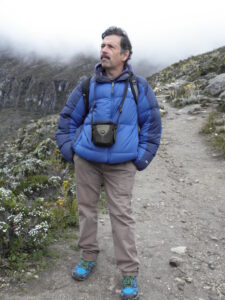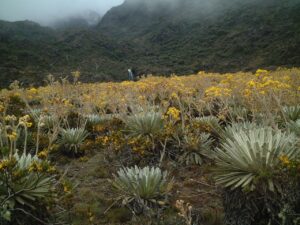Visiting Scholar Carlos García Núñez Shares His Passion for Tropical Ecology
Carlos García Núñez, a visiting scholar at the Center for Urban and Global Studies, is sharing his passion and expertise on tropical ecology with the Trinity College community. At the University of Los Andes in Venezuela, García Núñez’s home institution, he and a group of colleagues research the intricate ecosystems in the Andes. While at Trinity, García Núñez is working on writing and publishing his research, giving guest lectures, and collaborating with faculty on projects.
García Núñez describes the of ecology field as “the science that studies the interrelationship between living things and non-living things.” He uses this framework to discuss his work studying various ecosystems from high altitude cloud forest in Venezuela to his dissertation on the influence of seasonal droughts on tree vegetation in the savanna.

García Núñez’s draw to study ecology began as child living in Venezuela. “I grew up in a city that is small, surrounded by mountains in the Andes and in a very, very beautiful place,” described García Núñez. His childhood surrounded by nature and time exploring the mountains with family and friends drew him to the field of ecology.
Throughout his career, García Núñez has studied different crops including the cacao and sweet pepper, but one of his largest topics of study is the cloud forests. Cloud forests are high altitude forests in the Andes whose growth is affected by the formation of clouds. In his research, García Núñez measured the photosynthetic rates of trees in the cloud forest from atop a platform in the canopy of the forest. Through his research on the cloud forest García Núñez contributed to the understanding of deforestation’s effects on this extremely biodiverse ecosystem.
Through his research, García Núñez believes in the importance of ecology as a field. He describes the critical impact of his research when saying, “our obligation as humans is to preserve this heritage.” He believes learning about the environment enables us to better protect and preserve it for generations to come. “All this research deals with the functioning of the ecosystem. If you don’t have information on the functioning of the of the ecosystem, you cannot plan anything at all,” said García Núñez.
One project García Núñez has been working on at Trinity is a paper titled, “A Multi-Scale Approach for the Conservation and Restoration of the Cloud Forest.” In this paper, García Núñez reviews the research that has been done on the cloud forest over the past 70 years. The paper uses data collected by colleagues at the University of Los Andes.

While at Trinity College, García Núñez has also been working with Professor Nikisha Patel in the biology department researching ferns. “We put different species of ferns in different conditions in a growth chamber in order to simulate drought conditions in the air and make measurements of the photosynthetic responses,” explained García Núñez. Together, Patel and García Núñez are trying to determine how ferns react to different climate change scenarios.
To hear more about his work researching tropical ecology in Venezuela García Núñez is lecturing in the environmental science and biology departments. This semester he has a lecture in the environmental science department on March 31 in library room 103 from 1:30 to 2:30 pm titled, “Ecophysiology of the Treeline in the Venezuelan Andean Mountains.” García Nuñez’s lecture for the Biology Department is on Friday April 25 titled, “Dynamics of Woody Species Colonization in Grasslands of the Seasonal Savannas of Venezuela.”
García Núñez has been doing this work for decades and the importance of studying ecosystem’s reactions to climate change is only growing more urgent. The Andean ecosystems he studies are some of the most biodiverse in the world and preserving this diversity is essential to our world’s future. “After destruction and deforestation, we have to carry on thinking about how to restore the ecosystem,” remarked García Núñez.
Photos Courtesy of Carlos García Núñez
